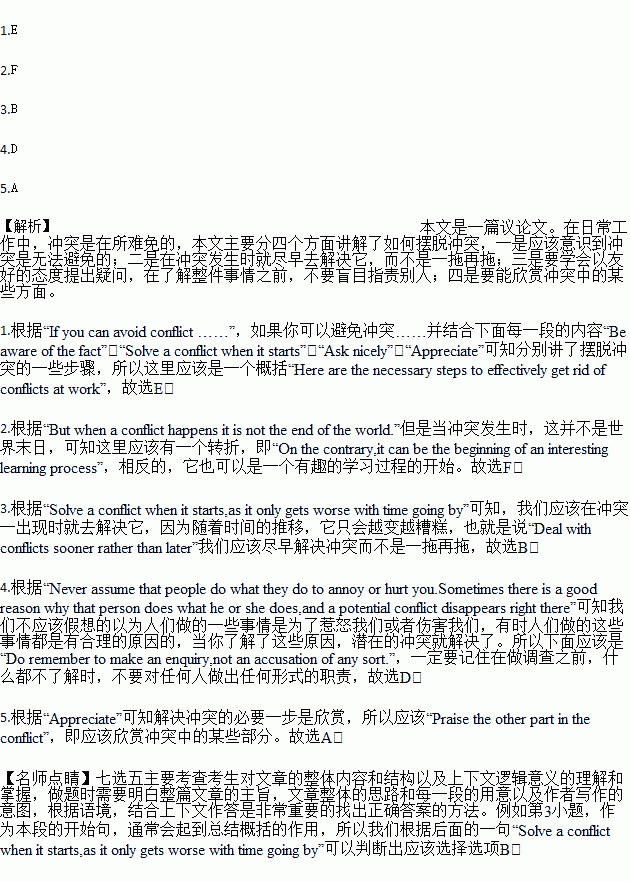题目内容
A conflict at work is common.If you can avoid conflict,it means you will win what you want regardless of what the other person wants.Since the potential problem has not been removed,it will simply reappear later.1.
◆Be aware of the fact that some conflicts are unavoidable at work.On many occasions(场合),conflict and disagreement are likely to happen.But when a conflict happens it is not the end of the world.2.Conflicts mean that people care enough to disagree strongly.The trick is not to allow the conflict to go on forever.
◆3.Solve a conflict when it starts,as it only gets worse with time going by.Everyone is waiting for the other to admit he or she is wrong and gets more unpleasant after the conflict has lasted a while.It is necessary to interrupt the "waiting game" before it gets to that point.
◆Ask nicely.If somebody has done something that makes you angry,or if you don't understand their viewpoints or actions,simply asking nicely about them can make a world of difference.Never assume that people do what they do to annoy or hurt you.Sometimes there is a good reason why that person does what he or she does,and a potential conflict disappears right there.4.
◆Appreciate.5.Tell them why it is worth it to you to solve the conflict.This can be difficult as few people find it easy to appreciate a person they disagree strongly with,but it is a great way to move forward.
A.Praise the other part in the conflict
B.Deal with conflicts sooner rather than later.
C.Invite the other person to talk about the situation.
D.Do remember to make an enquiry,not an accusation of any sort.
E.Here are the necessary steps to effectively get rid of conflicts at work
F.On the contrary,it can be the beginning of an interesting learning process.
G.Clear thinking is unlikely to happen while an argument continues to boil over.
Welcome to our school. You can do a lot of things here. Come and join us.
Timetable | |
Sunday 8:30---11:30 Personal Inventions You can see many inventions by the students; you may also bring your own inventions. | Monday 19:00---21:00 Space and Man Dr. Thomas West If you want to know more about the universe(宇宙). |
Wednesday 19:30---21:00 Modern Medicine Mrs. Lucy Green Would you like to know medical science? | Friday 18:30---21:00 Computer Science Mr. Harry Morison from Harvard University Learn to use Windows XP. |
1.You may have a chance to introduce your inventions on _________.
A. Sunday B. Monday
C. Wednesday D. Friday
2.You may learn something about a disease called TB from __________.
A. Dr. West B. Mr. Morison
C. Mrs. Green D. Mr. Thomas
3.If you want to learn something about satellites(卫星), you can go to the class from______.
A. 8:30 to 11:30 on Sunday B. 19:00 to 21:00 on Monday
C. 19:30 to 21:00 on Wednesday D. 18:30 to 21:00 on Friday
4.If you are not free in the morning, you can’t join in ________.
A. Space and Man B. Personal Inventions
C. Computer Science D. Modern Medicine
假如你叫李华,是一位成绩优秀的学生,你班班主任在安排座位时,让成绩好的学生和成绩差的学生作同桌,这在你们班成绩优秀的学生中引起了反响,大家就此进行了讨论。请以书信形式向报社编辑写封信,陈述学生讨论结果以及个人观点。
赞同 | 反对 | 你的观点 |
1.人人有长处和不足,成绩差的学生也有可取之处; 2.通过帮助学习差的学生的学习从而使他们建立自信。 | 1.部分学习差的学生常常违反校规,担心自己会受影响,养成坏习惯。 2.老是问问题,使自己不能专心学习。 |
注意:1.词数:100左右,短文的开头已为你写好,不计入总词数。
2.短文需包括表中所有要点,内容可适当发挥,以使行文连贯。
3.参考词汇:成绩差的学生:a slower student
____________________________________________________________________________________________
____________________________________________________________________________________________
____________________________________________________________________________________________
____________________________________________________________________________________________
____________________________________________________________________________________________
____________________________________________________________________________________________
____________________________________________________________________________________________
____________________________________________________________________


